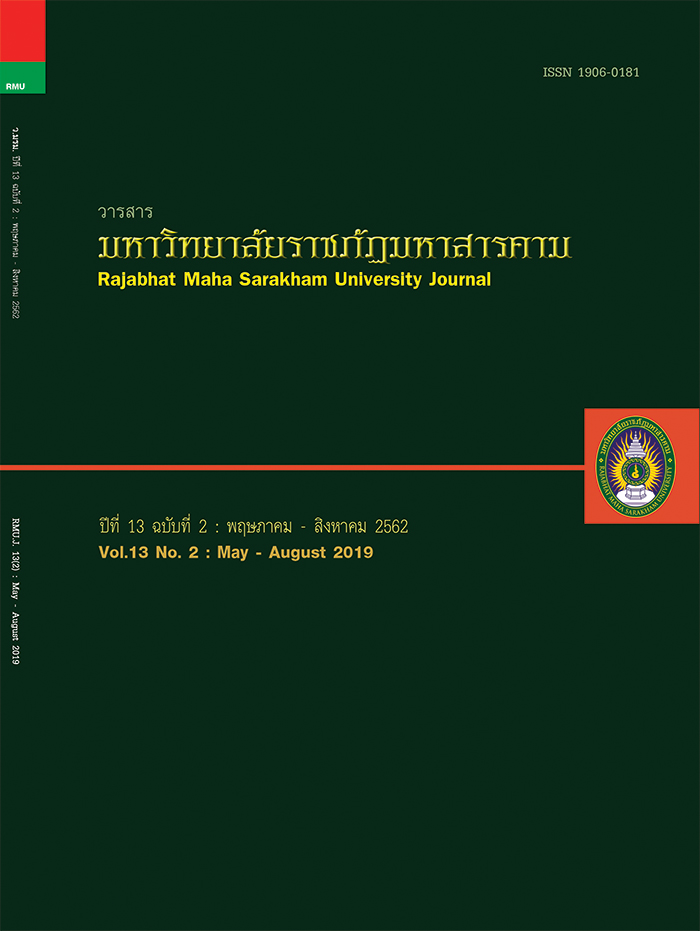การพัฒนารูปแบบการจัดการอาชีวศึกษาระบบทวิภาคีโดยการประยุกต์ใช้ หลักปรัชญาของเศรษฐกิจพอเพียง : กรณีศึกษาวิทยาลัยสารพัดช่างมหาสารคาม
Main Article Content
บทคัดย่อ
การวิจัยครั้งนี้มีวัตถุประสงค์เพื่อศึกษาองค์ประกอบ พัฒนารูปแบบ และศึกษาผลการทดลองใช้รูปแบบการจัดการอาชีวศึกษาระบบทวิภาคีโดยการประยุกต์ใช้หลักปรัชญาของเศรษฐกิจพอเพียง ดำเนินการวิจัย 3 ระยะ คือ ระยะที่ 1 ศึกษาองค์ประกอบของรูปแบบการจัดการอาชีวศึกษาระบบทวิภาคี โดยการสังเคราะห์และศึกษาความเหมาะสมขององค์ประกอบ จากกลุ่มตัวอย่าง จำนวน 266 คน ระยะที่ 2 พัฒนารูปแบบการจัดการอาชีวศึกษาระบบทวิภาคีโดยการประยุกต์ใช้หลักปรัชญาของเศรษฐกิจพอเพียง โดยการประชุมเชิงปฏิบัติการเพื่อร่างรูปแบบโดยผู้ทรงคุณวุฒิ จำนวน 12 คน และยืนยันรูปแบบโดยการสัมมนาอิงผู้เชี่ยวชาญ จำนวน 9 คน และระยะที่ 3 ศึกษาผลการทดลองใช้รูปแบบการจัดการอาชีวศึกษาระบบทวิภาคีโดยการประยุกต์ใช้หลักปรัชญาของเศรษฐกิจพอเพียง โดยการทดลองใช้รูปแบบในวิทยาลัยสารพัดช่างมหาสารคาม มีกลุ่มผู้ร่วมวิจัย จำนวน 90 คน ผลการวิจัย พบว่า
รูปแบบการจัดการอาชีวศึกษาระบบทวิภาคีโดยการประยุกต์ ใช้หลักปรัชญาของเศรษฐกิจพอเพียง ประกอบด้วย 6 องค์ประกอบ 28 ตัวชี้วัด ได้แก่ 1) ด้านความร่วมมือ มี 4 ตัวชี้วัด 2) ด้านการจัดหลักสูตร มี 6 ตัวชี้วัด 3) ด้านสถานประกอบการ มี 6 ตัวชี้วัด 4) การบริหารจัดการ มี 3 ตัวชี้วัด 5) ด้านการจัดการเรียนการสอน มี 6 ตัวชี้วัด และ 6) ด้านการวัดและประเมินผล มี 3 ตัวชี้วัด ส่วนผลการพัฒนารูปแบบจากการประชุมเชิงปฏิบัติการ ได้รูปแบบโดยการประยุกต์ใช้หลักปรัชญาของเศรษฐกิจพอเพียง ตามกรอบแนวคิดหลัก 3 ห่วง คือ ความพอประมาณ ความมีเหตุผล การมีภูมิคุ้มกันที่ดี และ 2 เงื่อนไข คือ ความรู้ คุณธรรม โดยการสัมมนาอิงผู้เชี่ยวชาญเพื่อยืนยันรูปแบบ สรุปได้ว่ารูปแบบมีความพอประมาณ ความมีเหตุผล และมีภูมิคุ้มกันที่ดีอยู่ในระดับมากที่สุด และผลการทดลองใช้รูปแบบ พบว่า สามารถดำเนินการตามรูปแบบได้อย่างมีประสิทธิผล กลุ่มผู้ร่วมวิจัยมีความพึงพอใจในระดับมากที่สุด และผลการประเมินรูปแบบ พบว่า การดำเนินโครงการมีความสอดคล้องตามหลักปรัชญาของเศรษฐกิจพอเพียง และมีรายการปฏิบัติตามตัวชี้วัดของโครงการ
Article Details
1. บทความที่ลงตีพิมพ์ทุกเรื่องได้รับการตรวจทางวิชาการโดยผู้ประเมินอิสระ ผู้ทรงคุณวุฒิ (Peer Review) สาขาที่เกี่ยวข้อง อย่างน้อย 3 ท่าน ในรูปแบบ Double blind review
2. ข้อคิดเห็นใด ๆ ของบทความที่ลงตีพิมพ์ในวารสารมหาวิทยาลัยราชภัฏมหาสารคาม นี้เป็นของผู้เขียน คณะผู้จัดทำวารสารไม่จำเป็นต้องเห็นด้วย
3. กองบรรณาธิการวารสารมหาวิทยาลัยราชภัฏมหาสารคาม ไม่สงวนสิทธิ์การคัดลอกแต่ให้อ้างอิงแสดงที่มา
เอกสารอ้างอิง
Pornchai Jedamarn. (2015). Sufficiency economy :dimension and dynamics of human resource management in the new millennium sustainably. Mahasarakham : Klum Printing.
Arkomterm Phittayaphaisit. (2014). Strategies for Developing the Border Economy City to Link Neighboring Countries. The Lecture document of Seminar on the Topic of Border Economy City Development : In case of new city managment, Chong Sa Ngam, Phu Sing District, Sisaket Province during 5 - 6 June 2014 at Sri LamduanHotel, Mueang Si Sa Ket District, Srisaket Province.
Siri Thee-arsana. (2014). Benchmarking, balanced scorecard and learn six sigma. Mahasarakham : Rajabhat Maha Sarakham University Printing Factory.
Kriengsak Chareonwongsak. (2007). Sufficiency Economy Course in Educational Institutions. Article.Today’s weekly study, 7 (315) , 340 ,January.
Bureau of Vocational and Professional Standards. (2012). Quality assurance manual in vocational education institutions.Office of the Vocational Education Commission, Ministry of Education.Bangkok : Minburi Technical College.
Office of the Vocational Education Commission. (2014). Guidelines for the implementation of bilateral vocational education system according to the announcement of Ministry of Education. Bangkok : Office of the Vocational EducationCommission.
Secretariat of the Senate. (2014). Thailand Reform Process for 2014. Research group and academic information office : Secretariat of the Senate.
Office of Education Standards and Quality Assessment (Public Organization). (2007). Standards and criteria for assessment of external quality assessment in vocational education round 2 (2011-2015). Bangkok : 21 Century.
Krejcie, R. V. & Morgan, D. W. (1970). Determining Sample Size for Research Activities. Educational and Psychological Measurement.
Bunchom Srisa-ard. (2013). Preliminary Research. 9th edition. Bangkok : Suweeriyasarn.
Siriwan Phuengkhajorn. (2004). Development of academic work in vocational education. Bangkok: [M.p.p.].
Worawit Sritrakul. (2014). Development of bilateral vocational education system management of NongKhai Technical College. Journal of Technical Education Development, 26 (90) , 101-108
Phitsanu Thonglert. (2012). The administrative innovation for dual vocational training system in Vocational College. Ph.D. thesis (Educational Administration), Silpakorn University.
Somrak Phacheesub. (2005). a presentation of tripartite vocational administration and management of the central vocational institution 3. Master of Education Thesis (Educational administration). : Phranakhon Si Ayutthaya Rajabhat University.
Theerawut Boonyasophon.(1999). Vocational and technical administration for industrial development. Bangkok : Textbook production center for King Mongkut’s Institute of Technology North Bangkok.
Anand Ngamsa-Ard. (2006). The Collaborative Management In Dual Vocational Trainning : A Case Of Detudom Technical College. Doctor of Education thesis (Educational Administration) Khon Kaen University.
Thanet Khumkerd. (2006). “Blog : Powerful tools of KM”. TNI Journal (Technology Promotion Association of Thailand - Japan), 33, 190 (December 2006 - January 2007), 80-83.
Eisner, E. (1976). Educational Connoisseurship and Criticism : Their form and Functions in Educational Evaluation. Journal of Aesthetic Evaluation or Education, 10 , 135-150.
Keeves P.J. (1988). Educational research, methodology and measurement : An international handbook. Oxford : Pergamon Press
Seree Chudchaem.(1995). Model. Bangkok :Children’s Club.
Phoodit Phadphin. (2014). Development of school administration model through the sufficient economy philosophy under Office of the Basic Education Commission.VRU Research and Development Journal Humanities and Social Science,9 (2), May-August.


